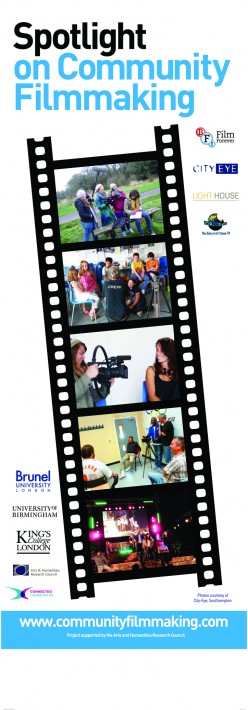Spotlight on Community Filmmaking
 Although the conference explicitly dealt with a range of international concerns throughout the sessions, the focus of this particular session was on identity and representational politics of community filmmaking in the UK. Steve Presence of the University of the West of England discussed his efforts to develop a Radical Film Network, triggered by the groundswell in community filmmaking organisations in the political domain. Nick Higgins, Director of the University of the West of Scotland’s Creative Media Academy shared his experience of leading on the fascinating Northern Lights Documentary Film Project and its resonance for Scottish identities. Kirsten Macleod also from the University of the West of Scotland (and Edinburgh Napier University) developed these themes by stressing how community media as a form of participatory practice allows people to mediate their own identities; thus the idea that community media is a process, which is also deeply connected to ideas of place. The session closed with Rob Coley from the University of Lincoln who explored how disconnection might be utilised as a catalyst that involves change.
Although the conference explicitly dealt with a range of international concerns throughout the sessions, the focus of this particular session was on identity and representational politics of community filmmaking in the UK. Steve Presence of the University of the West of England discussed his efforts to develop a Radical Film Network, triggered by the groundswell in community filmmaking organisations in the political domain. Nick Higgins, Director of the University of the West of Scotland’s Creative Media Academy shared his experience of leading on the fascinating Northern Lights Documentary Film Project and its resonance for Scottish identities. Kirsten Macleod also from the University of the West of Scotland (and Edinburgh Napier University) developed these themes by stressing how community media as a form of participatory practice allows people to mediate their own identities; thus the idea that community media is a process, which is also deeply connected to ideas of place. The session closed with Rob Coley from the University of Lincoln who explored how disconnection might be utilised as a catalyst that involves change.
The Community Politics, Social Innovation and Space parallel final session started by a reflexive presentation from Alistair Scott from Edinburgh Napier University on the way Scottish working class communities have been represented in the television documentary over the last 35 years. The rest of the session focused on the role and use of film making as a tool in researcher and designer practices. Paola Briata and Enrico Masi from University College London and the University if Bologna respectively, who explained how they have used film making to undertake a representation from the inside of the multi-ethnic community of Dalston in the East of London to better inform urban planning processes in the area. Finally, Elisa Bertolotti from the Politecnico di Milano presented how designers from the DESIS lab have used videos to document, study, communicate, visualise projects, promote dialogue and shame and amplify ideas to support their design work and generate social innovation.
Impact of the project
Research around innovation and cinema has tended to focus on the mainstream film value chain, with the role of innovation in culturally diverse community filmmaking contexts still under-developed. More broadly, community filmmaking, as a field of enquiry, has been characterised by a lack of academic writings integrating theory and empirical fieldwork in the last ten years.
The ‘Community Filmmaking and Cultural Diversity’ project has insisted on situating developments in community filmmaking in the social, cultural and political contexts in which they are based. Recognising the complex set of cultural, economic and social relationships and engagements in community filmmaking, the research has taken a wider perspective to consider the cascade of connections which are behind community filmmakers’ engagement with communities, industries, supporting institutions and audiences and which may impact on the cultural product and experience delivered as well as in urban/local development.
A short film of the conference highlights and selected presentations can be accessed via the project website, www.communityfilmmaking.com
For enquiries about the AHRC-funded Community Filmmaking and Cultural Diversity project, please contact: sarita.malik@brunel.ac.uk

 Learning on Screen
Learning on Screen